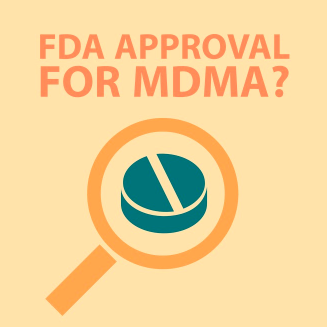
The drug 3,4-Methylenedioxymethamphetamine, also known as MDMA or ”Molly,” is a schedule I drug with no current medical use, according to the U.S. Drug Enforcement Administration (DEA). However, a recent study conducted by Jennifer M. Mitchell, Michael Bogenschutz and 36 other pioneers in therapeutic studies, stands to challenge that classification. More specifically, the researchers are showing that MDMA-assisted therapy is nearly twice as effective as therapy with a placebo in the treatment of Post-Traumatic Stress Disorder (PTSD).
The Phase 3 Trial
The study, titled MDMA-Assisted Therapy for Severe PTSD: a Randomized, Double-Blind, Placebo-Controlled Phase 3 Study, showed that combining MDMA use with therapeutic treatment was extremely effective at relieving PTSD.
At the start of the study, researchers randomly assigned 46 of the 91 participants to receive MDMA-assisted therapy. They assigned the other 45 to receive placebo treatments.
Eighteen weeks after the start of the study, 67% of those that received MDMA-assisted treatment showed lessened symptoms to the point where they were no longer diagnosable with PTSD. Only 32% of participants assigned to placebo experience such results.
By the third session, one-third of participants assigned to MDMA-assisted treatment met the criteria for PTSD remission. However, only 5% of placebo participants had reached that milestone, according to the study.
What’s Next?
The publication of this study is good news for the use of MDMA-assisted therapy in PTSD treatment.
After phase 3 testing of a drug or treatment, all that remains is applying to and receiving approval from the U.S. Food and Drug Administration (FDA). Easier said than done, to be sure. But with promising results such as these, it’s entirely possible that the FDA could approve this revolutionary treatment within the next year or so.
If the FDA approves MDMA, officials would have to reclassify it, according to the DEA. They will most likely reschedule it as schedule II, or a controlled drug for medical use. This means that MDMA will still be illegal outside of its medical applications. So no great upheaval of drug enforcement will result.
However, the impact of FDA approval cannot be understated. It could subsequently open many doors for further study on the effects and medical application of MDMA and other psychedelic drugs.
MDMA vs. Traditional Treatments
The next question is, why should patients use MDMA therapy over other, already approved treatments?
According to Jennifer Mitchell and the other authors of the study, many patients find traditional treatments including Zoloft (sertraline) and Paxil (paroxetine) ineffective. The authors explain:
“The selective serotonin reuptake inhibitors (SSRIs) sertraline and paroxetine are [FDA]-approved first-line therapeutics for the treatment of PTSD. However, an estimated 40–60% of patients do not respond to these compounds.”
These figures are not promising. But, because these drugs prove ineffective, the researchers saw an opportunity to improve upon the available treatments. That led them to study MDMA.
The study’s authors further elaborate,
“[…] Although evidenced-based trauma-focused psychotherapies such as prolonged exposure and cognitive behavioral therapy are considered to be the gold standard treatments for PTSD, many participants fail to respond or continue to have significant symptoms, and dropout rates are high. Novel cost-effective therapeutics are therefore desperately needed”
As such, they set out to test the effectiveness of therapy in combination with MDMA.
The difference between drug treatment and psychotherapy (with or without MDMA) comes down to what aspect of PTSD each attempts to remedy. Most pharmaceutical treatments, such as the ones described by the study’s authors, treat PTSD by lessening or removing the symptoms associated with it, like anxiety and depression.
However therapeutic treatments, as with most kinds of therapy, seek to change associations within the brain and root out the causes of PTSD. In this study, researchers strived to make therapy more efficient in the treatment of PTSD.
They seemingly succeeded. Specifically, results show remarkable improvement over placebo methods. As such, MDMA-assisted therapy seems to be a promising type of PTSD treatment. And the FDA may agree.
With approval likely on the horizon, this revolutionary remedy is revealing a new frontier of psychological research.



I really enjoyed the article. My father, a veteran of Desert Storm, has PTSD from things he witnessed. That along with survivors guilt has done a number on his mental health. 3 years ago we started MDMA treatment and it has helped him tremendously. It brings a smile to my face to finally see a push for this form of treatment.